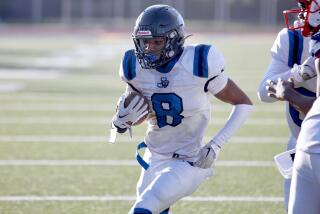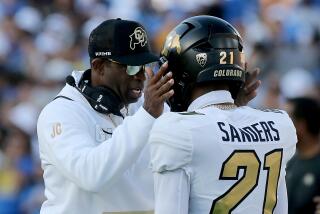AN UNCERTAIN FUTURE : FORMER DETROIT STAR LEAVES SDSU, IS EMBITTERED WITH BASKETBALL TEAM
- Share via
SAN DIEGO — Tenocha Hall, a high-rise dormitory on the periphery of the San Diego State University campus, bustled with activity as students packed their belongings and prepared to vacate their rooms for the summer.
In Room 214, Anthony Sands appeared to be nearly ready for the exodus. Among the few items he had not put in boxes were a basketball and a poster of George (The Iceman) Gervin, which was taped to the wall above the pillow of his bunk.
Unlike many of the other underclassmen moving out of the dorm, Sands did not envision a summer of relaxation followed by a return to school in the fall. His departure is likely to be permanent.
A seldom-used sophomore guard on Coach Smokey Gaines’ Aztec basketball team, Sands will be leaving San Diego State later this week after two unhappy years in which he never adjusted to life as a collegiate athlete.
Embittered by a lack of playing time and poor rapport with his coach, Sands will be facing an uncertain future as he returns home to the east Detroit neighborhood where he grew up, and from which Gaines himself had emerged some 20 years earlier.
“I would like to make known the scandalous way in which Mr. Gaines dealt with me,” said Sands, who mixes ghetto jive with classroom English, and is given to wearing a coat and tie along with sneakers. “I am not speaking out of vengeance. I would like to see Mr. Gaines reevaluate his actions and I would like to see other young athletes treated differently.”
Sands charged that Gaines treated him with indifference and often spoke in vulgar terms while failing to give him a chance to perform.
“He will probably say I am a crazy, mixed-up kid who isn’t as good as he thinks he is,” Sands said.
Gaines, who had already suggested that Sands transfer to another college, seemed to have exhausted his patience, but still spoke without animosity.
“Anthony quit the team twice this year and I took him back both times,” Gaines said. “If I had put it to a vote of the players, they probably would have not given him a third chance.”
Sands spoke vaguely of pursuing his career at Eastern Michigan University, while in the next breath he mingled the prospect of attending law school and spreading the gospel of Elijah Muhammad.
His basketball career, it appears, is over. Gaines told him to prepare a list of teams he would consider, and was dumbfounded when Sands mentioned Georgetown, Villanova, Boston College, Michigan State and Syracuse. The implication was, if Sands couldn’t start for San Diego State, how could he expect to succeed at a powerhouse such as Georgetown?
Gaines was the only major college coach who recruited Sands, and he may be the last resort for the 20-year-old athlete. The basketball coach at Eastern Michigan, James Boyce, said he had no scholarships open and would not, in any case, be interested in extending one to Sands.
Jesse Evans, former assistant to Gaines and now on the staff at the University of Wyoming, said he thought Sands could make a contribution to any team in the Western Athletic Conference, but added that Wyoming has no scholarships available.
There is little in Sands’s story to distinguish him from the malcontents who comprise a minority of every college football and basketball program in America. It would be difficult to find a youth who had accepted an athletic scholarship with the expectation of serving only as practice fodder. A coach would be wasting his time by recruiting an athlete who didn’t appear to be good enough to be a starter one day.
But the Sands case does raise questions about the responsibilities of an institution and a coach to a student-athlete who has put forth a good-faith effort. Is there an obligation on the part of a coach who lures a high school athlete 2,000 miles from home to see that the young man does not destroy his future in a fit of immaturity?
Gaines did not address the questions with alacrity, but he appeared to harbor no guilt over his handling of Sands.
“I am not going to get into a mud-slinging contest,” Gaines said. “I don’t feel an obligation, but I am going to try to help Anthony. I have no malice or animosity against him. I have been fair. I gave him an opportunity to get education and broaden himself for the future. Anthony has to understand there are other people in the world besides himself.”
Gaines denied making any promises to Sands in the recruiting period. Friends in Detroit had made him aware of the 6-foot 6-inch guard at East Catholic High School several years ago.
“I try to tell all the kids when we recruit ‘em that we will get ‘em up at 5:30 a.m. and make ‘em run,” Gaines said. “I gave Anthony no false illusions. I met his mother and dad, and I liked them. When he quit this year, she told Anthony he should listen to his coach.”
Gaines seemed to view Sands as a self-centered individual who did not work as hard as he should have, a view partially shared by other players.
“He’s a good player, but he’s in his own world,” guard Creon Dorsey said. “He would leave practice without any rapport with the players. I tried to get him to lighten up, but he would get sarcastic and say, ‘Let me figure it out for myself.’ I think he meant well, but it all came out wrong. Smoke is going to push you to your limit to make you a better player.”
A source close to the team said Sands had the ability to be a role player at San Diego State, but lacked the necessary skills as a passer, rebounder and defensive player to be a star.
“He’s smart and not a bad kid,” the source said, “but he may have an identity problem. I think his association with the Muslims gave him a feeling of superiority.”
Sands became interested in the Muslim religion after reading the “Autobiography of Malcolm X” when he was 12 years old.
Sands said one of his goals in life is “to educate other (blacks) about their true history, which was denied them by the slave-masters.”
If Gaines disapproved of Sands’ involvement with the Muslim following, it was because he believed Sands was neglecting his studies, the coach said.
Sands suggested that making the transition from an inner-city neighborhood to a predominantly-white society was difficult for him, but he seemed to take pride in having met the challenge. He said he made a 2.0 average his first semester and had made similar grades since. A school official declined to provide any information on his academic performance.
The departure of Evans from the San Diego State coaching staff after the 1983-84 season may have had an adverse effect on the future of Sands. It is clear there was a close relationship between them.
“Anthony was a conscientious student and was progressing toward a degree when I was there,” Evans said. “He came to practice each day and worked hard. If a kid is progressing academically and not creating problems, who am I--or any coach--to say what faith he chooses?”
Evans said he would be willing to help Sands find a place in another basketball program.
“I’m an optimist, I believe he can be a good player,” Evans said. “Anthony wants to use basketball to get an education and do well in life.
“We would be interested in him, but we have no scholarships left right now. I believe he could help any WAC program, but I can’t say he would be a starter.”
Sands claimed Gaines misled him about his future as a college player. “He’s a slick talker from Detroit, and he ran a quick one on me,” Sands said. “He turned out to be a tyrant. He didn’t treat me right. I never understood why he was unhappy with me.”
Part of Sands’ problem in relating to Gaines was his refusal to grant the authority the coach deemed appropriate.
“He likes players to look up to him and praise him,” Sands said. “Where I come from, every man is a man; there are no man-boy relationships. Mr. Gaines stays on top of the hill and drives a Mercedes Benz. That’s nothing to me. I’ve seen 16-year-olds driving Benzes and wearing fur coats. I’m well spoken and I know the slick games people run in the streets. Mr. Gaines was threatened by the dynamics of my personality.”
Sands, whatever his intentions in ripping Gaines, has cut himself off from any future as an Aztec. But he seems unconcerned by that.
“I hope I can play ball somewhere,” Sands said. “I’m hungry to play. Other players said Mr. Gaines would hurt me and try to blackball me. But I have to take a stand. If I have to sacrifice myself, I will do it.”
Gaines tried to be diplomatic in addressing the player’s future. “He thinks he can just jump somewhere else,” Gaines said. “Well . . . he can’t stay here. I want him to go and be happy. He’s his own man.”
More to Read
Get our high school sports newsletter
Prep Rally is devoted to the SoCal high school sports experience, bringing you scores, stories and a behind-the-scenes look at what makes prep sports so popular.
You may occasionally receive promotional content from the Los Angeles Times.





